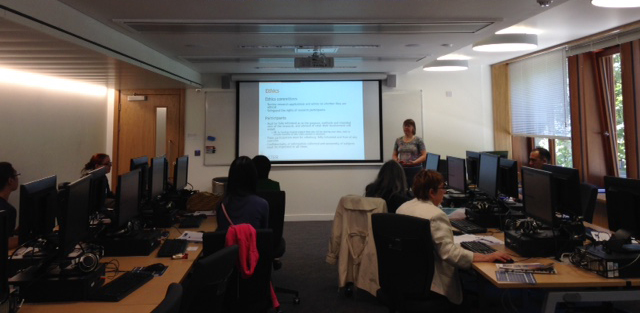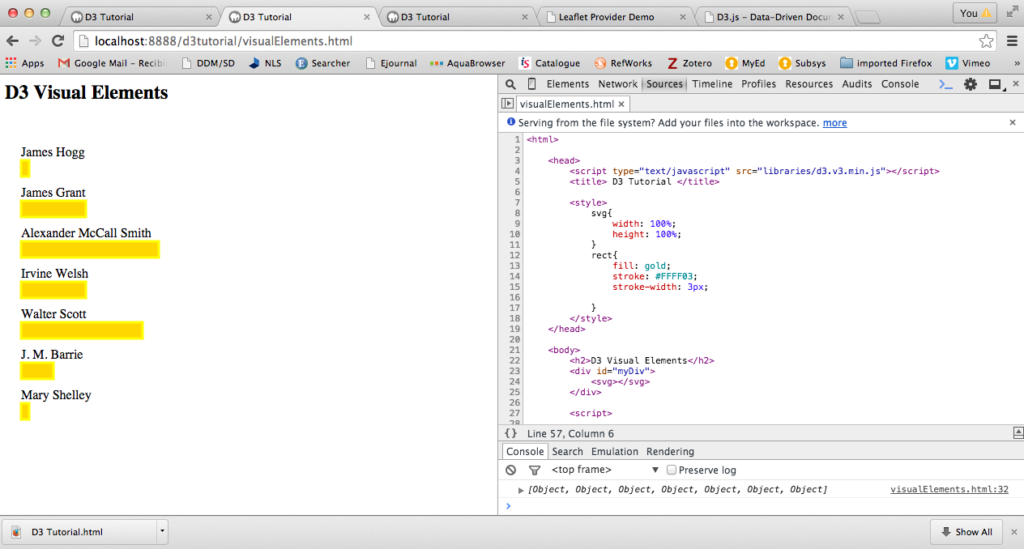Digimap have scheduled two “open surgery” webinars, open to all Digimap users. These hour long sessions offer the opportunity for you to ask any questions you may have about Digimap. Our team have a wealth of experience of mapping data and can help you with: using the service – how to get the map or data you […]
Category Archives: Events
DATA-X Pioneering Research Data Exhibition & Symposium
DATA-X has been a University of Edinburgh IS Innovation Fund project, also supported by the Data Lab and ASCUS. The project provided a dynamic platform for University of Edinburgh student researchers across all schools to come together and develop collaborate installations that explore data re-use and interdisciplinary boundaries. Research data are often invisible and complex to comprehend by the public and academic peers, with evolving technology and researcher-driving environments, DATA-X facilitate student researchers with the opportunity to visualize and communicate their research in a user-friendly format to audiences from within and outside the university.
After a series of successful and engaging DATA-X workshops, aimed to inform, shape and create ‘installations’ linked to digital data, the multidisciplinary teams (including students from the School of Architecture and Landscape Architecture, Edinburgh College of Art, Reid School of Music, the School of Engineering, The Centre for Synthetic and Systems Biology, the School of Chemistry, the Centre for Integrative Physiology and the Queen’s Medical Research Institute) continued to work on their installations throughout the summer in preparation for the DATA-X exhibition and Symposium.
DATA-X Exhibition:Â
The DATA-X Exhibition ran from 26 November to 6 December 2016, in the Sculpture Court of the Edinburgh College of Art. A total of six physical installations were installed:
eTunes by Dr Siraj Sabihuddin
 A collaborate project for novices to experience the process and creative input required in constructing a musical instrument from start to finish.
A collaborate project for novices to experience the process and creative input required in constructing a musical instrument from start to finish.
Feel the Heat by Nathalie Vladis and Julia Zaenker
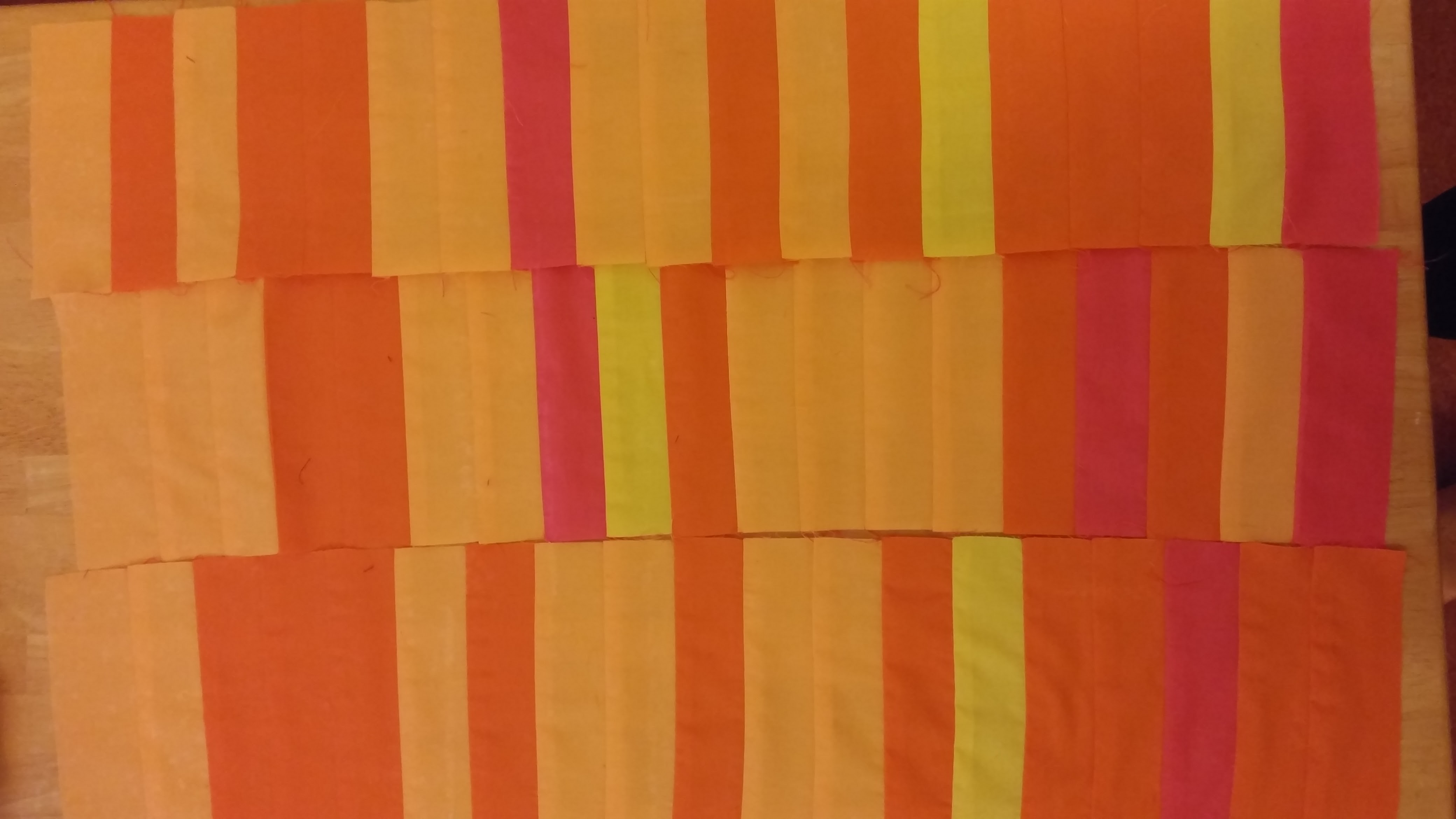 A data quilt, visualising world temperatures between 1961 to 1990. The installation included temperature data sets and interactive colouring maps for audience participation.
A data quilt, visualising world temperatures between 1961 to 1990. The installation included temperature data sets and interactive colouring maps for audience participation.
Inside the black box by Luis Fernando Montaño and Bohdan Mykhaylyk
 An installation simulating bacterial infections. The audience controls the bacterial infection by interactively administering treatment.
An installation simulating bacterial infections. The audience controls the bacterial infection by interactively administering treatment.
PUROS Sound Box by Dr. Sophia Banou, Dr. Christos Kakalis and Matt Giannotti
 An installation that ‘defines’ an ambient musical environment, that is conditioned by the movement of users on an interactive floor.
An installation that ‘defines’ an ambient musical environment, that is conditioned by the movement of users on an interactive floor.
Sinterbot by Adela Rabell Montiell and Dr. Siraj Sabihuddin
 A hands on demonstration on the alternative use of an ordinary household microwave for sintering, in order to alter material by heat.
A hands on demonstration on the alternative use of an ordinary household microwave for sintering, in order to alter material by heat.
Surface of Significance by Lucas Godfrey and Matt Giannotti
 An audio-visual installation that reconceptualise geographic space. The installation explores the relationship between space, materiality and process.
An audio-visual installation that reconceptualise geographic space. The installation explores the relationship between space, materiality and process.
The exhibition launch, on 26 November, also included three performance installations that serenaded the audience throughout the evening:
- o ire by Prof. Nick Fells
A live audio performance during which the performance controller sculpt and shape sounds as the piece unfolds.
- Wind Gust 42048 by Matt Giannottii
A composition based on wind data captured during Hurricane Matthew. Musicians captured the chaotic nature of the storm by moving around and inflecting sporadic sound intensity.
- Elegy for Eagle Philippines by Oli Jan
An excerpt of Oli Jan’s composition project ‘The Carnival of the Endangered Animals‘. The piece features sounds of endangered species on the IUCN Red List.
DATA-X Symposium
To accompany the exhibition, a DATA-X symposium was held on 1 December 2016 in the Main Lecture Theatre of the Edinburgh College of Art. PhD researchers presented their ‘installations’ and demonstrated the tools, processes and techniques behind the installation. This was an informal event and an open forum to facilitate discussion with an academic and non-academic audience. Guest speakers included Dr Jane Haley, Scientific Coordinator for Edinburgh Neuroscience and FUSION, and Dr James Howie, co-founder of ASCUS. Their talks entitled ‘FUSION –where art meets neuroscience’ and ‘ASCUS and the ASCUS Lab: catalysts for Artisience’, illustrated the efficacy of bridging the gap between the arts and sciences and how innovative, multidisciplinary projects can engage wider audiences and create novel public engagement initiatives.
The next and final phase of the project includes the creation of a DATA-X Exhibition Catalogue in which the students will publish their installations. Updates to follow soon.
Data-X Project Manager: Stuart Macdonald (Associate Data Librarian at Edinburgh University Data Library)
Exhibition Coordinator: Dr. Rocio von Jungenfeld (Supported Research Data services at EDINA & Data Library)
Data-X PhD Interns:
Scully Beaver Lynch – PhD candidate in Architecture by Design, Edinburgh College of Art
Adela Rabell Montiel – PhD candidate in Cardiovascular Sciences, Edinburgh Medical School: Clinical Sciences
Cindy Nelson-Viljoen – PhD candidate in Archaeology, School of History, Classics and Archaeology
Dr. Siraj Sabihuddin – PhD in Electronic engineering, School of Engineering
Image credit: DATA-X blog. http://data-x.blogs.edina.ac.uk/
by Cindy Nelson-Viljoen
PhD Student Intern
EDINA and Data Library
Research Data Management (RDM) Forum
RDM Forum is a newly created platform to bring together both researchers and research & IT support staff from across the University whose role involves helping academics in managing their research data. The aim of the Forum is to share good practice, exchange experiences as well as discuss current and future challenges related to data curation, preservation and publishing. We hope that the Forum will allow its participants to learn from one another and gain a new perspective on some common issues.
The Forum takes the form of meetings as well as e-mail updates (done through the RDM Forum mailing list) and an online platform (SharePoint website) for sharing useful resources, engaging with each other and keeping up-to-date with recent developments in RDM.
The first meeting took place on 7th December 2016. There were 24 in attendance and participants had the opportunity to introduce themselves, ask questions, and provide their expectations and suggestions for future RDM Forum meetings, which have been summarised below:
- Overcoming challenges:
- Supporting academic engagement
- Going beyond funder requirements
- Engagement beyond training
- Avoiding last-minute arrangements
- Addressing concerns about data sharing and reuse
- Finding solutions that will work
- Early training
- Establishing workflows for standard processes
- Developing an Information Governance structure for data
- Sharing real-life scenarios
- Forum structure
- Forming several user groups focused on specific aspects of RDM
- Organising meetings around specific themes
- Updates from Research Data Service team
- Forum as a platform for training
- Forum to meet every two months at different locations
If you are interested in joining the Forum mailing list you can do so at: https://mlist.is.ed.ac.uk/lists/info/rdm-forum
RDM Forum SharePoint website (access by request) is available at:
https://uoe.sharepoint.com/sites/rdmforum
Cuna Ekmekcioglu
Senior Research Data Officer
Data Carpentry & Software Carpentry workshops
The Research Data Service hosted back to back 2-day workshops in the Main Library this week, run by the Software Sustainability Institute (SSI) to train University of Edinburgh researchers in basic data science and research computing skills.
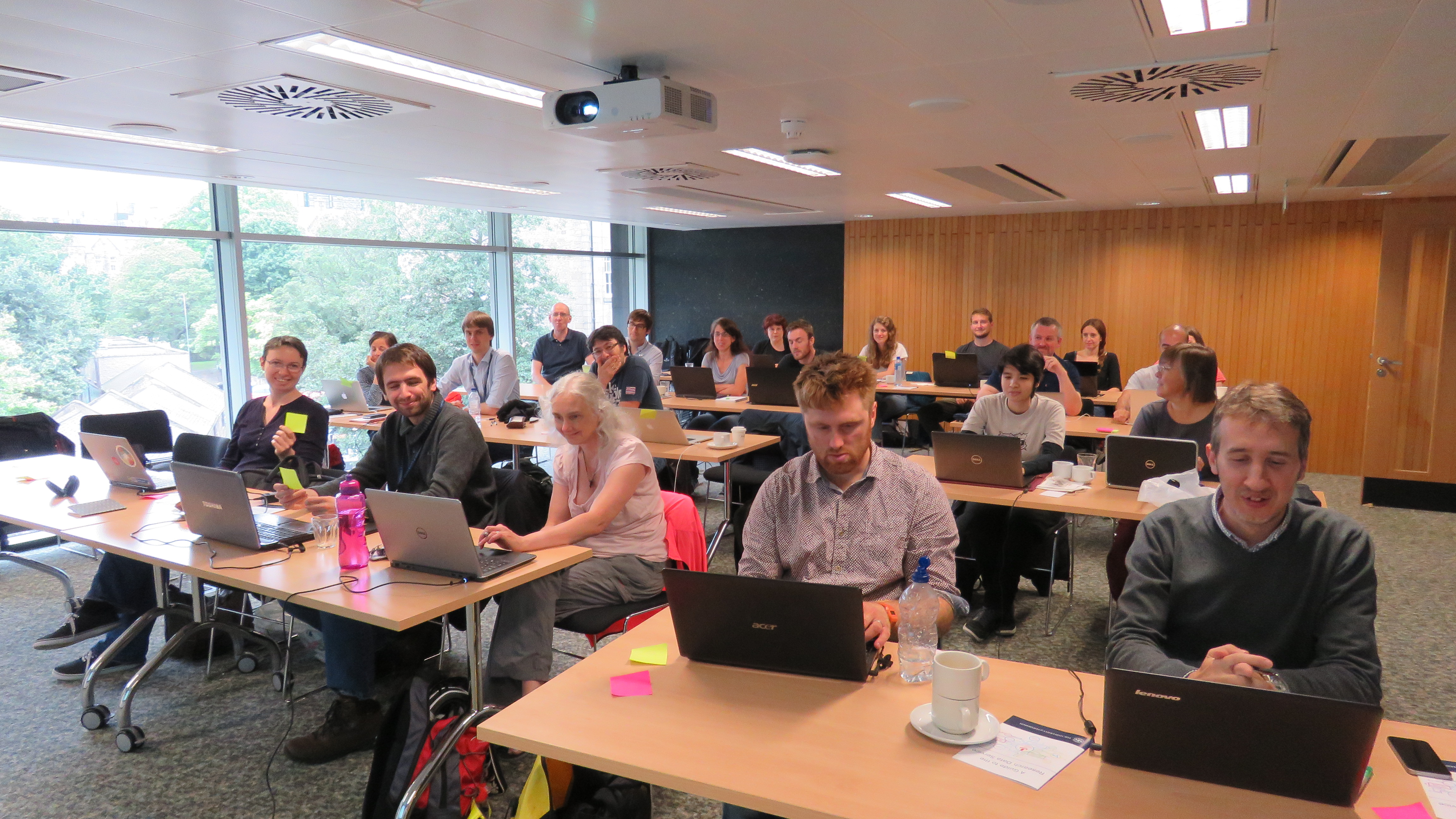
Learners at Data Carpentry workshop
Software Carpentry (SC) is a popular global initiative originating in the US, aimed at training researchers in good practice in writing, storing and sharing code. Both SC and its newer offshoot, Data Carpentry, teaches methods and tools that helps researchers makes their science reproducible. The SSI, based at Edinburgh Parallel Computing Centre (EPCC), organises workshops for both throughout the UK.

Martin Callaghan, University of Leeds, introduces goals of Data Carpentry workshop.
Each workshop is taught by trainers trained by the SC organisation, using proven methods of delivery, to learners using their own laptops, and with plenty of support by knowledgeable helpers. Instructors at our workshops were from Leeds and EPCC. Comments from the learners – staff and postgraduate students from a range of schools, included, ‘Variety of needs and academic activities/disciplines catered for. Useful exercies and explanations,’ and ‘Very powerful tools.’
Lessons can vary between different workshops, depending on the level of the learners and their requirements, as determined by a pre-workshop survey. The Data Carpentry workshop on Monday and Tuesday included:
- Using spreadsheets effectively
- OpenRefine
- Introduction to R
- R and visualisation
- Databases and SQL
- Using R with SQLite
- Managing Research & Data Management Plans
The Software Carpentry workshop was aimed at researchers who write their own code, and covered the following topics:
- Introduction to the Shell
- Version Control
- Introduction to Python
- Using the Shell (scripts)
- Version Control (with Github)
- Open Science and Open Research
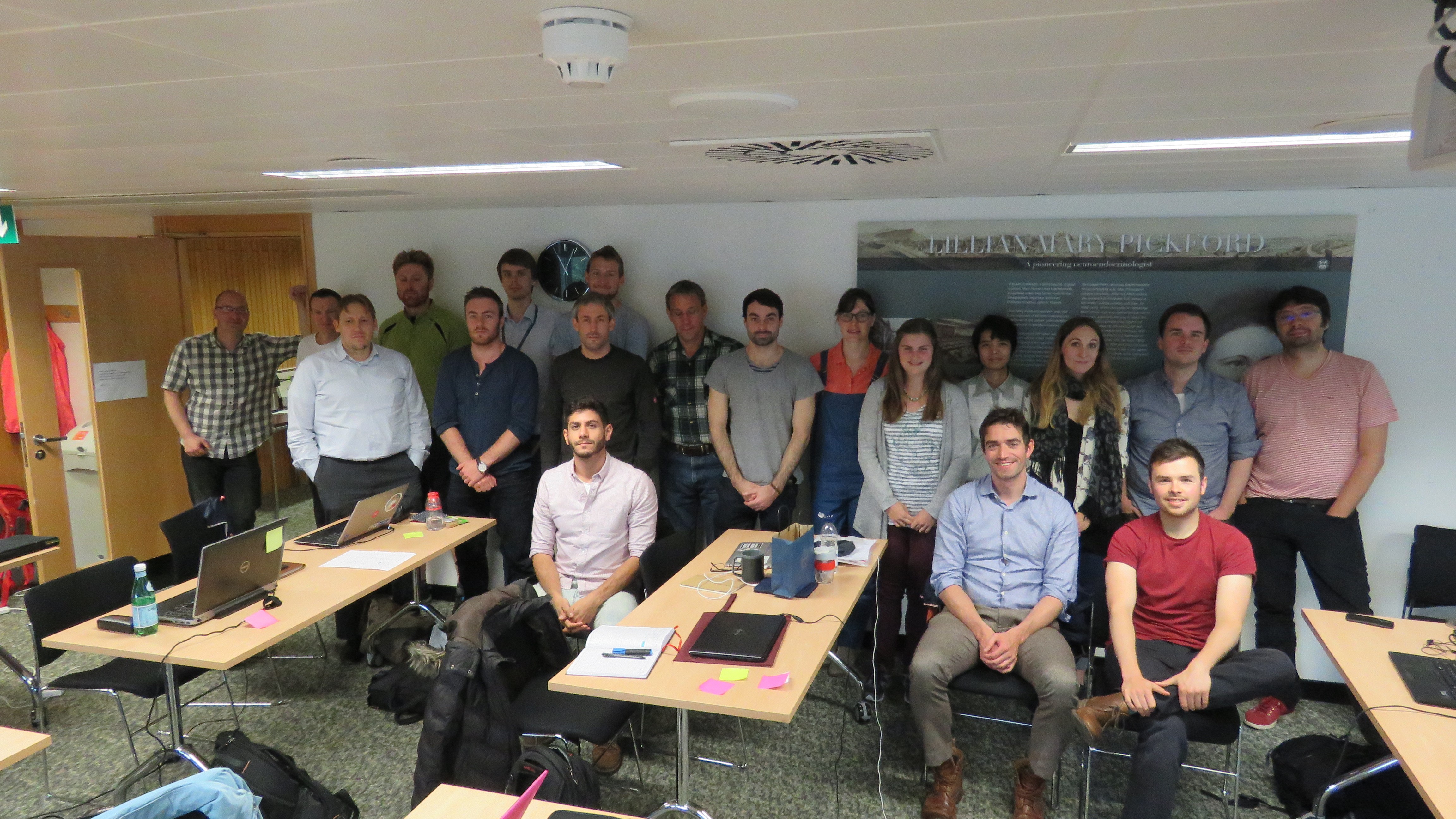
Software Carpentry learners
Clearly the workshops were valued by learners and very worthwhile. The team will consider how it can offer similar workshops in the future at a similarly low cost; your ideas welcome!
Robin Rice
EDINA and Data Library
Jisc Data Vault update
Posted on behalf of Claire Knowles
Research data are being generated at an ever-increasing rate. This brings challenges in how to store, analyse, and care for the data. Part of this problem is the long term stewardship of researchers’ private data and associated files that need a safe and secure home for the medium to long term.
 The Data Vault project, funded by the Jisc #DataSpring programme seeks to define and develop a Data Vault software platform that will allow data creators to describe and store their data safely in one of the growing number of options for archival storage. This may include cloud solutions, shared storage systems, or local infrastructure.
The Data Vault project, funded by the Jisc #DataSpring programme seeks to define and develop a Data Vault software platform that will allow data creators to describe and store their data safely in one of the growing number of options for archival storage. This may include cloud solutions, shared storage systems, or local infrastructure.
Future users of the Data Vault are invited to Edinburgh on 5th November, to help shape the development work through discussions on: use cases, example data, retention policies, and metadata with the project team.
Book your place at: https://www.eventbrite.co.uk/e/data-vault-community-event-edinburgh-tickets-18900011443
The aims of the second phase of the project are to deliver a first complete version of the platform by the end of November, including:
- Authentication and authorisation
- Integration with more storage options
- Management / monitoring interface
- Example interface to CRIS (PURE)
- Development of retention and review policy
- Scalability testing
Working towards these goals the project team have had monthly face-to-face meetings, with regular Skype calls in between. The development work is progressing steadily, as you can see via the Github repository: https://github.com/DataVault, where there have now been over 300 commits. Progress is also tracked on the open Project Plan where anyone can add comments.
So remember, remember the 5th November and book your ticket.
Claire Knowles, Library & University Collections, on behalf of the JISC Data Vault Project Team
Research Data Alliance – report from the 6th Plenary
The Research Data Alliance or RDA is growing about as fast as the data all around us. It got off the ground in 2012 with the support of major research funders in Europe, the US and Australia and has since grown to over 3,000 members. The latest plenary in Paris set a new registration record of ~700 ‘data folk’ including data scientists, data managers, librarians and policy-makers. The theme was Enterprise Engagement with a focus on Research Data for Climate Change.
Not an ordinary conference
What sets RDA apart from other data-related organisations is not just the size of its gatherings, but its emphasis on making change. Parallel sessions are not filled with individual presentations of research papers, but of collaborative activities that lead to outputs that can be used in the real world. Working groups are approved by governance structures that coalesce around actual problems that cannot be solved by individual organisations but require new top-level approaches. They are required to produce their deliverables and close shop after an 18 month period. Interest groups are allowed to exist longer, but are encouraged to spin off working groups to address changes as they are identified through group discussion.
Hard-working groups
Since 2012, these working groups have produced some impressive deliverables and pilots that if implemented across the Web and across organisations and countries could speed up research and improve reproducibility. They are governed by an elected group of experts, worldwide. Some current active projects are:
- Data Foundation and Terminology WG: defining harmonised terminology for diverse communities used to their own data ‘language’
- Data Type Registries WG: building software to implement a DTR that can automatically match up unknown dataset ‘types’ with relevant services or applications (such as a viewer)
- PID Information Types WG: Creating a single common API for delivering checksums from multiple persistent identifier service providers (DataCite and others)
- Practical policy WG: building on a previous WG that collected various machine-actionable policies practiced by different data centres and repositories, this group will register the policies to move repository managers to move towards a harmonised set.
- Scalable Dynamic Data Citation WG: to solve the difficulty of properly citing dynamic data sources, the recommended solution allows users to re-execute a query with the original time stamp and retrieve the original data or to obtain the current version of the data.
- Data Description Registry Interoperability WG: to solve the problem of scattered datasets across repositories and data registries, the group build Research Data Switchboard linking datasets across platforms.
- Metadata Standards Directory WG: By guiding researchers towards the metadata standards and tools relevant to their discipline, the directory drives up adoption of those standards, improving the chances of future researchers finding and using the data.
Members of the RDM team have been involved in library and repository-related interest groups and Birds of a Feather groups, where surveys of current practice have circulated.

Not all men at RDA! Dame Wendy Hall from the Web Science Institute leads a Women’s Networking Breakfast – photo courtesy of @RDA_Europe
RDA and climate change
Climate science was prominent in the 6th RDA plenary. This was not only due to the imminent Paris-based United Nations COP talks, but indeed due to issues of critical importance for the world today. For some years, driven by the climate model inter-comparison work underpinning Intergovernmental Panel on Climate Change (IPCC) reports and the massive datasets from Earth observation climate science has been located at an intersection of high performance computing, big data management, and services to support and stimulate research, commerce, and governmental initiatives.
Assessment of the risks posed by climate change, and strategies for adaptation and mitigation sharpens the need to solve not only the technical problems of bringing together diverse data (social, soil, climate, land-use, commercial,…) but also to address the policy challenges, given the diverse organisations needing to cooperate. This is a domain that builds on services to give access to data, for computation close to data enabled by e-infrastructure (such as EGI), and one that requires ever stronger approaches to brokering these resources and services, to permit their orchestration and integration.
Among initiatives presented in the climate-related sessions were:
- GEOSS – The GEOSS Common Infrastructure allows the user of Earth observations to access, search and use the data, information, tools and services available through the Global Earth Observation System of Systems
- Global Agricultural Monitoring (GEOGLAM) initiative in response to the growing calls for improved agricultural information.
- An RDS group focused on wheat – the volatility in prices, in part driven by climate unpredictability, has become a major concern.
- The IPSL Mesocentre
- IS-ENES developing services for climate modelling especially
- Copernicus, seeking to “support policymakers, business, and citizens with improved environmental information. Copernicus integrates satellite and in-situ data with modeling to provide user-focused information services�
- CLIPC will provide access to climate datasets, and software and information to assess indicators for climate impact.
Dr. Mike Mineter, School of GeoSciences and Robin Rice, EDINA and Data Library
Dealing with Data 2015 – Programme
Date:                    Monday 31 August 2015, 9:30 – 16:30
Location:Â Â Â Â Â Â Â Â Â Â Â Â Informatics Forum and Appleton Tower, University of Edinburgh
Bookings for the Dealing with Data conference are now open. Bookings can be made via: https://www.events.ed.ac.uk/index.cfm?event=book&scheduleID=15936
Draft Programme
09:30 Refreshments
10:00 Welcome
10:05 Opening keynote: Title TBC, Prof Jonathan Silvertown, Institute of Evolutionary Biology
10:45 Session 1 – Informatics Forum
10:45 – 11:05: University data, open data and the Smart Data Hack, Ewan Klein, Informatics.
11:05 – 11:25: Edinburgh Data Science Introduction. Mark Parsons, EPCC.
11:25 – 11:45: Channel shift – using data analysis to improve service delivery at the City of Edinburgh Council. Michael Wasilewski, Informatics.
11:45 Break
12:00 – 13:00 Session 2 – Informatics Forum
12:00 – 12:20: What are the challenges of collecting and analysing data in primary care? Lessons learned from a feasibility study in six general practices in Lothian, Scotland. Natalia Calanzani, Debbie Cavers, Gaby Vojt, David Weller, Christine Campbell, Poplation Health Sciences and Informatics.
12:20 – 12:40: Facilitating the reuse of brain imaging and clinical data from completed studies across the life course: the Brain Images of Normal Subjects (BRAINS) Imagebank. Samuel Danso, Dominic E. Job, David Alexander Dickie, David Rodriguez, Andrew Robson, Cyril Pernet, Susan D. Shenkin, Joanna M. Wardlaw, Brain Sciences.
12:40 – 13:00: Scottish Neighbourhood Statistics and R: Adding value to a public data resource with the ‘tidy data’ paradigm. Jon Minton, AQMeN.
12:00 – 13:00 Session 2 – Appleton Tower
12:00 – 12:20: Data ecosystems and wicked problems; supporting “students as researchers� in complex data environments. Arno Verhoeven, ECA; James Stewart, SPS; Ewan Klein, Informatics.
12:20 – 12:40: Factors shaping learners’ interactions in networked learning context. Srećko Joksimović, Dragan GaÅ¡ević, Education
12:40 – 13:00: Automated Content Analysis of Discussion Transcripts. Vitomir Kovanovic, Dragan Gašević, Informatics and Education.
13:00 Lunch
13:45 – 14:45 Session 4 – Informatics Forum
13:45 – 14:05: Trans-national access to commercial ‘big data’ inside China capturing the demographics and consumption of millions of consumers across a wide range of physical and digital market channels, Ashley Llyod (Title to be confirmed).
14:05 – 14:25: Gone Fishing: The Creation of the Comparative Agendas Project Master Codebook, Shaun Bevan, SSPS.
14:25 – 14:45: Electronic lab notebooks and research data management at Edinburgh Experience to date and challenges and opportunities going forward. Rory Macneil, RSpace.
13:45 – 14:45 – Session 5 – Appleton Tower
13:45 – 14:05: Tweeting Jonson’s “Foot Voyage�: deeply mapped data, Anna Groundwater, HCA.
14:05 – 14:25: University of Edinburgh Reid Concerts Database Project, Fiona Donaldson, Music.
14:25 – 14:45: Title to be confirmed, Professor Viviene Cree and Dr Steve Kirkwood, The University of Edinburgh, with Dr Daniel Winterstein, Sodash.
14:45 Break
15:00 – 16:00 Session 6 – Informatics Forum
15:00 – 15:20: The VELaSSCo framework: a software platform for end user analytics and visualization of large simulation datasets, G. Filippone, A. Janda, K.J. Hanley, S. Papanicolopulos and J.Y. Ooi, IIE, Engineering.
15:20 – 15:40: From raw data to new fundamental particles: The data management lifecycle at the Large Hadron Collider, Andrew Washbrook, Physics.
15:40 – 16:00: Tipping the balance – introducing data management on a centre-wide level, Tomasz Zieliński, Eilidh Troup, Andrew Millar, Biology.
16:00 Closing talk: Kevin Ashley, Director, Digital Curation Centre
16:30 End
Fostering open science in social science
 On 10th of June, the Data Library team ran two workshops in association with the EU Horizon 2020 project, FOSTER (Facilitate Open Science Training for European Research), and the Scottish Graduate School of Social Science.
On 10th of June, the Data Library team ran two workshops in association with the EU Horizon 2020 project, FOSTER (Facilitate Open Science Training for European Research), and the Scottish Graduate School of Social Science.
The aim of the morning workshop, “Good practice in data management & data sharing with social research,� was to provide new entrants into the Scottish Graduate School of Social Science with a grounding in research data management using our online interactive training resource MANTRA, which covers good practice in data management and issues associated with data sharing.
The morning started with a brief presentation by Robin Rice on ‘open science’ and its meaning for the social sciences. Pauline Ward then demonstrated the importance of data management plans to ensure work is safeguarded and that data sharing is made possible. I introduced MANTRA briefly, and then Laine Ruus assigned different MANTRA units to participants and asked them to briefly go through the units and extract one or two key messages and report back to the rest of the group. After the coffee break we had another presentation on ethics, informed consent and the barriers for sharing, and we finished the morning session with a ‘Do’s and Dont’s exercise where we asked participants to write in post-it notes the things they remembered, the things they were taking with them from the workshop: green for things they should DO, and pink for those they should NOT. Here are some of the points the learners posted:
DO
– consider your usernames & passwords
– read the Data Protection Act
– check funder/institution regulations/policies
– obtain informed consent
– design a clear consent form
– give participants info about the research
– inform participants of how we will manage data
– confidentiality
– label your data with enough info to retrieve it in future
– develop a data management plan
– follow the certain policies when you re-use dataset[s] created by others
– have a clear data storage plan
– think about how & how long you will store your data
– store data in at least 3 places, in at least 2 separate locations
– backup!
– consider how/where you back up your data
– delete or archive old versions
– data preservation
– keep your data safe and secure with the help of facilities of fund bodies or university
– think about sharing
– consider sharing at all stages. Think about who will use my data next
– share data (responsibly)
DON’T
– unclear informed consent
– a sense of forcing participants to be part of research
– do not store sensitive information unless necessary
– don’t staple consent forms to de-identified data records/store them together
– take information security for granted
– assume all software will be able to handle your data
– don’t assume you will remember stuff. Document your data
– assume people understand
– disclose participants’ identity
– leave computer on
– share confidential data
– leave your laptop on the bus!
– leave your laptop on the train!
– leave your files on a train!
– don’t forget it is not just my data, it is public data
– forget to future proof
Our message was that open science will thrive when researchers:
- organise and version their data files effectively,
- provide comprehensive and sufficient documentation for others to understand and replicate results and thus cite the source properly
- know how to store and transport your data safely and securely (ensuring backup and encryption)
- understand legal and ethical requirements for managing data about human subjects
- Recognise the importance of good research data management practice in your own context
The afternoon workshop on “Overcoming obstacles to sharing data about human subjects� built on one of the main themes introduced in the morning, with a large overlap of attendees. The ethical and regulatory issues in this area can appear daunting. However, data created from research with human subjects are valuable, and therefore are worth sharing for all the same reasons as other research data (impact, transparency, validation etc). So it was heartening to find ourselves working with a group of mostly new PhD students, keen to find ways to anonymise, aggregate, or otherwise transform their data appropriately to allow sharing.
Robin Rice introduced the Data Protection Act, as it relates to research with human subjects, and ethical considerations. Naturally, we directed our participants to MANTRA, which has detailed information on the ethical and practical issues, with specific modules on “Data protection, rights & access� and “Sharing, preservation & licensing�. Of course not all data are suitable for sharing, and there are risks to be considered.
In many cases, data can be anonymised effectively, to allow the data to be shared. Richard Welpton from the UK Data Archive shared practical information on anonymisation approaches and tools for ‘statistical disclosure control’, recommending sdcMicroGUI (a graphical interface for carrying out anonymisation techniques, which is an R package, but should require no knowledge of the R language).
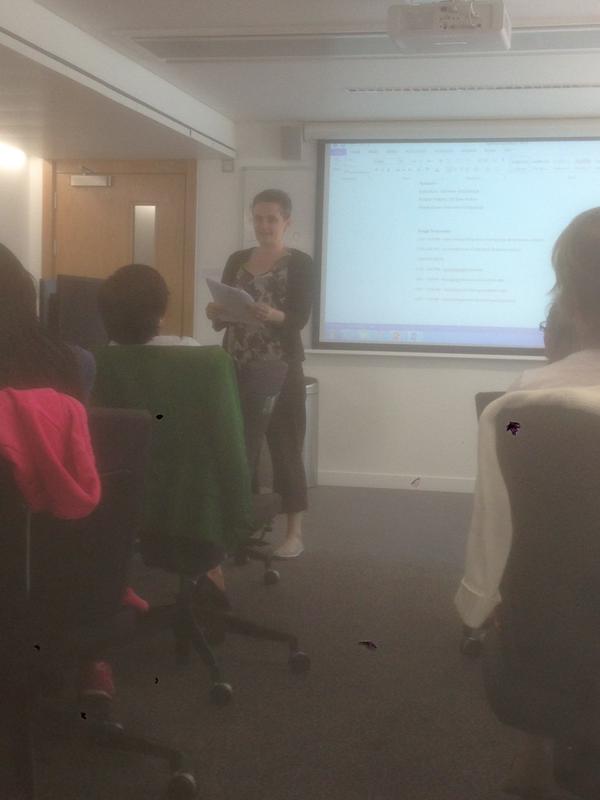 Finally Dr Niamh Moore from University of Edinburgh shared her experiences of sharing qualitative data. She spoke about the need to respect the wishes of subjects, her research gathering oral history, and the enthusiasm of many of her human subjects to be named in her research outputs, in a sense to own their own story, their own words.
Finally Dr Niamh Moore from University of Edinburgh shared her experiences of sharing qualitative data. She spoke about the need to respect the wishes of subjects, her research gathering oral history, and the enthusiasm of many of her human subjects to be named in her research outputs, in a sense to own their own story, their own words.
Links:
- Scottish Graduate School of Social Science
- FOSTER Open Science
- Research Data Management Training – MANTRA course
Rocio von Jungenfeld & Pauline Ward
EDINA and Data Library
Data Visualisation with D3 workshop
Last week I attended the 4th HSS Digital Day of Ideas 2015. Amongst networking and some interesting presentations on the use of digital technologies in humanities research (the two presentations I attended focused on analysis and visualisation of historical records), I attended the hands-on `Data Visualisation with D3′ workshop run by Uta Hinrichs, which I thoroughly enjoyed.
The workshop was a crash course to start visualising data combining d3.js and leaflet.js libraries, with HTML, SVG, and CSS. For this, we needed to have installed a text editor (e.g. Notepad++, TextWrangler) and a server environment for local development (e.g. WAMP, MAMP). With the software installed beforehand, I was ready to script as soon as I got there. We were recommended to use Chrome (or Safari), for it seems to work best for JavaScript, and the developer tools it offers are pretty good.
First, we started with the basics of how the d3.js library and other JavaScript libraries, such as jquery or leaflet, are incorporated into basic HTML pages. D3 is an open source library developed by Mike Bostocks. All the ‘visualisation magic’ happens in the browser, which takes the HTML file and processes the scripts as displayed in the console. The data used in the visualisation is pulled into the console, thus you cannot hide the data.
For this visualisation (D3 Visual Elements), the browser uses the content of the HTML file to call the d3.js library and the data into the console. In this example, the HTML contains a bit of CSS and SVG (Scalable Vector Graphics) element with a d3.js script which pulls data from a CSV file containing the details: author and number of books. The visualisation displays the authors’ names and bars representing the number of books each author has written. The bars change colour and display the number of books when you hover over.
The second visualisation we worked on was the combination of geo-referenced data and leaflet.js library. Here, we combine the d3.js and leaflet.js libraries to display geographic data from a CSV file. First we ensured the OpenStreetMap loaded, then pulled the CSV data in and last customised the map using a different map tile. We also added data points to the map and pop-up tags.
In this 2-hour workshop, Uta Hinrichs managed to give a flavour of the possibilities that JavaScript libraries offer and how ‘relatively easy’ it is to visualise data online.
Workshop links:
- Visualising data with D3 workshop – http://www.digital.hss.ed.ac.uk/news/digital-day-of-ideas-2015/uta-hinrichs/
- Dr Uta Hinrichs (St Andrews University) – http://www.utahinrichs.de/
- D3 website (find out all about D3) – http://d3js.org/
- Mike Bostocks’s website – http://bost.ocks.org/mike/
- Github D3 gallery – https://github.com/mbostock/d3/wiki/Gallery
Other links:
- Digital Scholarship website – http://www.digital.hss.ed.ac.uk/
- Lorna E. Campbell’s blog post about the event – https://lornamcampbell.wordpress.com/2015/05/29/day-of-digital-ideas-2015/
Rocio von Jungenfeld
EDINA and Data Library
Dealing with Data 2015 – Call For Papers
Date:                    Monday 31 August 2015, 9:30 – 16:00 (lunch provided)
Location:Â Â Â Â Â Â Â Â Â Â Â Â Informatics Forum, University of Edinburgh
Themes:
Data creation, including non-traditional data types
Data analysis
Data visualisation
Data security
Working with sensitive data
Archiving and sharing data, including preservation, re-use, and licensing
Infrastructure and tools, for example Electronic Lab Notebooks
Research software development and preservation
Linked open data for research, working with government data
Big Data and data mining
Meeting funder requirements for research data management
Format:Â Â Â Â Â Â Â Â Â Â Â
Presentations will be 15 minutes long, with 5 minutes for questions. Depending on numbers, thematic parallel strands may be used. Presentations will be aimed at an academic audience, but from a wide range of disciplines. Opening and closing keynote presentations will be given.
Call for proposals:
Leading edge research is reliant upon data that are produced or collected during the research process, or on existing data that is being analysed and re-used in new research questions. It is important to effectively manage research data throughout the lifecycle, from data management planning through to archiving and sharing. Requirements for managing data are increasingly being adopted by institutions and funders in order to foster good research data management practices.
Following on from  the successful ‘Dealing with Data 2014’ half-day conference, Information Services are pleased to announce that we will be hosting a one-day conference covering a broad range of research matters from all disciplines on the subject of ‘Dealing with Data’.
The aim of the conference is for researchers of all levels at the University of Edinburgh to share good practice, emerging techniques and technologies, and practical examples in working with data across the research lifecycle.
We welcome proposals for presentations on any aspect of the challenges and advances in working with data, particularly research with novel methods of creating, using, storing, visualising or sharing data. A list of themes is given above, although proposals that cover any aspect of working with research data will be considered.
Please send abstracts (maximum 500 words) to dealing-with-data-conference@mlist.is.ed.ac.uk   before Monday 29th June 2015. Proposals will be reviewed and the programme compiled by Friday 31st July 2015.
Cuna Ekmekcioglu
Library and University Collections

